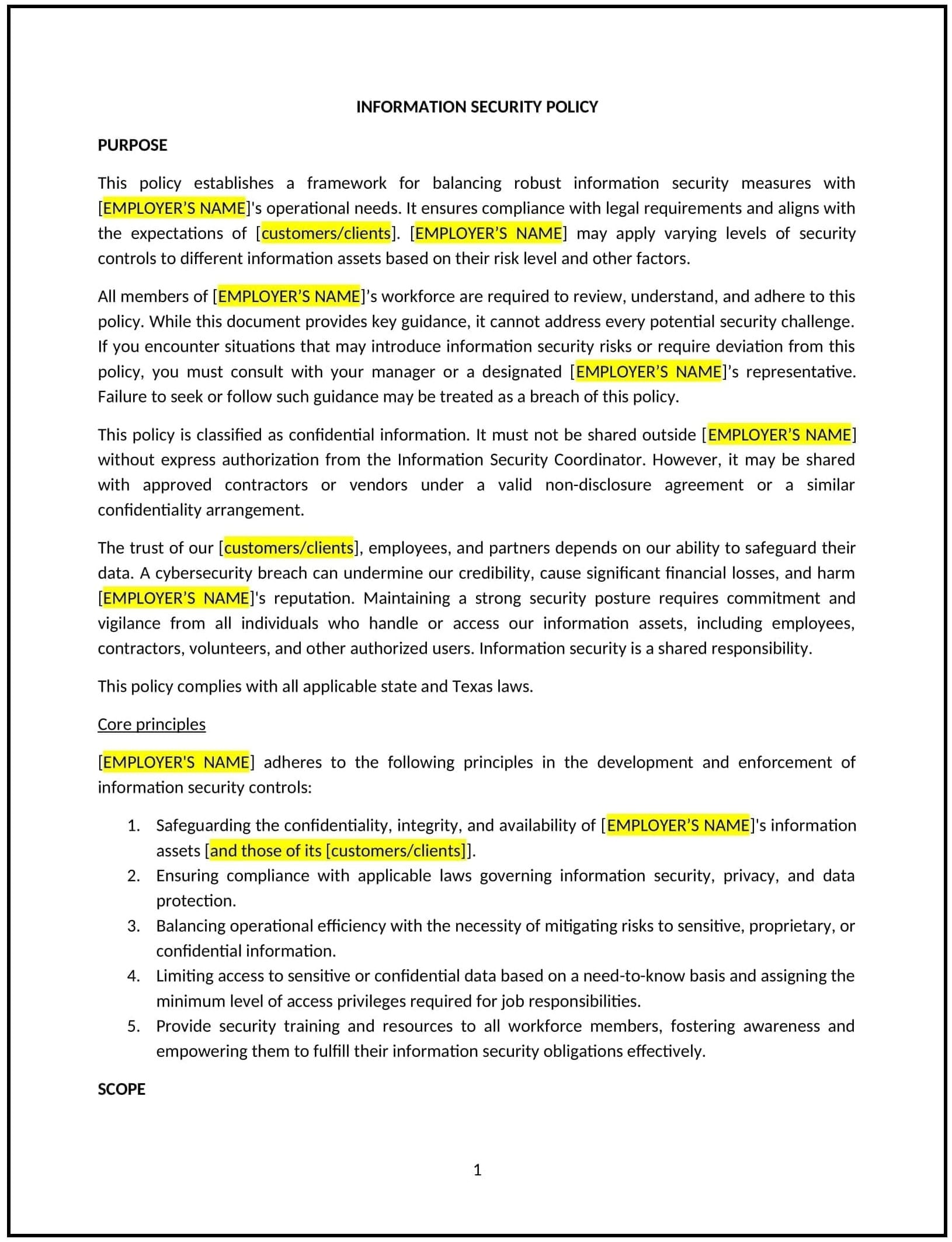Got contracts to review? While you're here for policies, let Cobrief make contract review effortless—start your free review now.

Customize this template for free
Information security policy (Texas)
This information security policy is designed to help Texas businesses establish clear guidelines for protecting sensitive company and customer data from unauthorized access, breaches, or loss. The policy outlines the procedures for maintaining the confidentiality, integrity, and availability of critical information, improving compliance with Texas state laws, federal regulations, and industry best practices.
By adopting this policy, businesses can safeguard their digital assets, maintain customer trust, and reduce the risk of cyber threats and legal liabilities.
How to use this information security policy (Texas)
- Define sensitive information: Clearly specify what constitutes sensitive information, including personally identifiable information (PII), financial data, intellectual property, and any other proprietary or confidential business information.
- Set access control measures: Outline procedures for controlling access to sensitive data, including role-based access controls, authentication requirements, and the use of passwords or biometric verification.
- Address data encryption: Specify the use of encryption technologies to protect sensitive information both in transit and at rest, ensuring that unauthorized individuals cannot access or tamper with data.
- Establish employee responsibilities: Define the responsibilities of employees regarding information security, including safe handling of data, reporting potential security incidents, and following company protocols for safeguarding digital assets.
- Implement monitoring and auditing: Set guidelines for regularly monitoring access to sensitive information and auditing system logs to detect and prevent unauthorized access or potential security threats.
- Develop an incident response plan: Create a clear process for responding to security incidents, including how breaches are reported, investigated, and mitigated, as well as how customers and authorities are notified if necessary.
- Provide security training: Offer regular training on information security best practices, including how to identify phishing attempts, use strong passwords, and handle sensitive data securely.
Benefits of using this information security policy (Texas)
This policy offers several benefits for Texas businesses:
- Protects sensitive data: By implementing robust security measures, businesses can prevent unauthorized access, theft, or loss of critical information, which is essential for maintaining privacy and security.
- Complies with legal and regulatory requirements: This policy supports compliance with Texas state laws, federal regulations (such as the CCPA or HIPAA), and industry standards (such as PCI-DSS) related to data protection.
- Enhances customer trust: Demonstrating a commitment to information security helps build and maintain trust with customers, who are more likely to engage with businesses that prioritize data privacy.
- Reduces risk of security breaches: A clear policy and consistent enforcement help mitigate the risks of data breaches, which can lead to financial loss, reputational damage, and legal consequences.
- Promotes a culture of security: Employees become more aware of their role in maintaining information security, contributing to an overall culture of caution and vigilance within the organization.
Tips for using this information security policy (Texas)
- Communicate the policy clearly: Ensure that all employees understand the importance of information security, their role in protecting sensitive data, and the consequences of failing to follow security protocols.
- Provide ongoing training: Regularly offer training on current threats and best practices for maintaining information security, including recognizing phishing attempts and using strong passwords.
- Use strong access controls: Implement multi-factor authentication (MFA), strong passwords, and encrypted communication to ensure that only authorized individuals have access to sensitive data.
- Monitor systems regularly: Continuously monitor IT systems, networks, and access logs to detect suspicious activity and prevent unauthorized access to sensitive information.
- Review regularly: Update the policy and security protocols regularly to address emerging security threats, new compliance requirements, or changes in business operations.